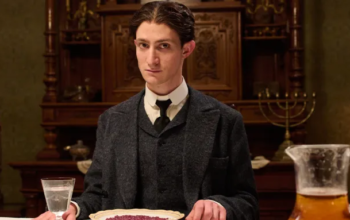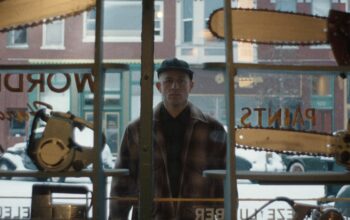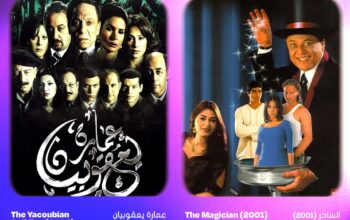A victim searches for his torturer to take revenge on him. Upon his arrival, his view of dealing with this torturer changes, whose face he did not see during the torture, but he realizes his trace from his smell that he did not forget when he was subjected to him.
Details about the story of a young Syrian man, whose events and incidents began in Syria, and then moved to Europe between France and Germany, this is the plot of the French film “Ghost Trail”, which was shown for the first time in the Arab world as part of the official competition activities of the seventh edition of the “El Gouna Film Festival”.
The events start with muffled sounds of torture, and the overcrowding of detainees in narrow spaces in the prison, some of whom are injured and on the verge of death, and others suffer from shock, which begins to be revealed when Syrian soldiers throw prisoners into the desert to face death. But “Hamid” (played by French-Tunisian actor Adam Bessa) overcomes death and saves his life.
With the events that start two years after the incident in which “Hamid” lost his wife and young son, the hero appears as a member of a secret group that pursues the symbols of the Syrian regime who fled to Europe, and his mission is to search for his former executioner who seeks revenge on him in a journey that makes him give up his right to obtain refugee status in Germany after suspecting that his executioner is in Paris.
“Hamid”, who meets on the network with his colleagues during a group electronic game, tries to stay in France under the pretext of searching for his cousin, but he hides the truth from his mother, claiming that he is studying in Germany safely.
“Hamid” embarks on a journey to seek justice and revenge to reach his executioner, whose face he has never seen, because he is careful every time he wants to torture prisoners to cover his face for fear of knowing his identity. However, everything he was seeking to achieve changes with several situations over the months he lives following the trail of his executioner.
French director Jonathan Meyer says that the idea for the film came by chance while he was working on projects related to presenting documentaries about immigrants, and through a friend who talked to him about the story. He was excited about the film because it relies on details of human stories of real Syrians who he actually sat with before filming, noting that “the fear of the heroes of the real story for the lives of their families who still live in Syria prevented them from appearing in the film.”
He added that he worked to surround himself with a team of Arab filmmakers because he does not speak Arabic, which constitutes the largest part of the dialogue in the film, which helped him greatly, noting that he used his background in presenting documentaries while working on the film and choosing the method of filming the scenes related to the events.
Egyptian critic Tarek El-Shennawy expressed his admiration for the film’s rhythm and events to Asharq Al-Awsat, stressing that it gained special value due to the nature of the events that take place outside Syria’s borders, but at the same time it focuses on an aspect of suffering through following several stories, most of whose details were characterized by extreme realism and the limited amount of what the director added to confirm the hypothesis he put forward in the film.
He added that the director sought to highlight the violence that Syrians were exposed to internally by recalling their past, in addition to their continued interest in their country, Syria, and what is happening there. He pointed out that the idea of talking about monitoring Syrians after their escape reflects the difficulties faced by some people who may believe at one point that they are now safe.
The French director believes that the idea he wanted to convey focused on the hero’s journey and the loss of his wife and son, and his attempt to return to the life he lives alone, far from his mother, with whom he communicates online to check on her. He pointed out that the heroes admired the film after watching it during the editing stage, and the conveying of part of the suffering they experienced on screen.
Published oct 27, 2024.









